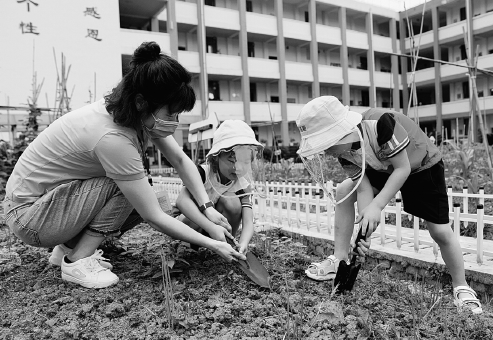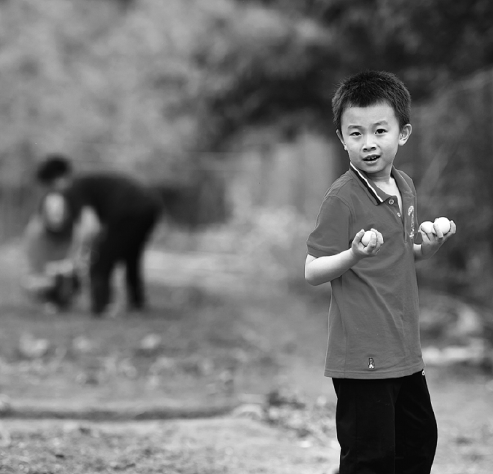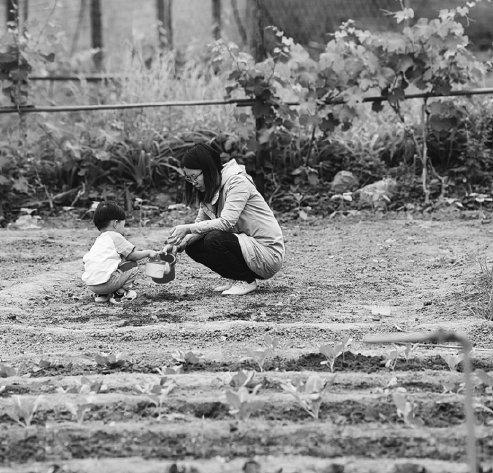City dwellers flock to farmland for weekend
Proponents say experience provides peace and teaches life skills away from hectic metropolis. Wang Keju reports.

For many rural Chinese people, the ultimate dream over the past few decades was to gain a secure foothold in a big city. But some city dwellers are now gradually retreating from urban life and traveling back to the countryside to grow food and enjoy a more peaceful existence.
Wu Wei, a 29-year-old primary school teacher in Beijing, descended on an almost evenly-divided farmland in the city outskirts with her family during the weekends. They wore fresh towels around their necks, sunscreen cream on their hands and shiny boots on their feet.
From shoveling manure and watering crops to pulling weeds and repairing fences, every move they made revealed that they are greenhorns to farmland chores. But that didn't deter them from trying.
Wu called the narrow strip of land she rented her "backyard," where she spent leisure time with her family every other week in the lap of nature. Her existing job, residence and friends motivated her to make a radical change of moving to the countryside for good.
"These are important considerations and a part of our normal social fabric that give life substance," she said. "Bur renting a farmland allowed the me and my family to get away from the concrete jungle once in a while and have the best of both types of living."
Wu yearned for a taste of the rural life since she saw country folk living in more traditional and healthier way of life on the television.
She used to do a lot of sightseeing in the rural areas over holidays and weekends, but there was always a sense of engagement missing when simply acting as a tourist.
When seeing friends post weekend pictures on a rented farmland last year, she drove there for a field trip and signed a yearlong lease with the farm owner on the spur of the moment. Now the rented farmland is able to meet her bucolic desire for reconnecting with Mother Earth.
"When my vegetables were growing very well, a fellow farmer came over and approved of my work. He said I could teach new farmers. When I heard him say this, I felt happier than when I got a bonus at the office," she said.
Quite a few city dwellers like Wu are intrigued by the rural lifestyle, where they see value in its positive benefits for their lives and their families. Many are trading days of high-pressure lives in the cities for slower, simpler ones in the countryside over their weekends.
Qi Guangwen, a former civil servant and now a farmland owner who runs a rental business in a suburb of Beijing, has seen an increasing number of people flock to countryside for a small piece of land and join the "weekend farmer" fleet in the past few years.
However, becoming a farmer had never occurred on the 63-year-old's agenda until his uncle invited him for a weeklong homestay on the farmland several years ago. He already obtained a lawyer's certificate through self-study at that time and had a detailed plan in mind about entering the legal profession after his retirement.
"As I got away from the hustle and bustle of the city, the sounds of construction sites and 24/7 traffic are replaced with birds singing and crickets chirping. Life in the country seems to scream 'slow down'," he said.
It suddenly dawned on Qi with nature at the doorstep, living in the countryside provides lots of peace and plenty of fresh rural air-a bonus for physical and mental health. He made up his mind to spend his retired life as a farmer instead of a lawyer.
After contracting about 1.5 hectares of land from his uncle, he soon cleared the land, planted his favorite peppermint and an array of other vegetables, and within two years had the land thriving with organic eggplant, cucumber, long bean, tomato and leek.
"In the beginning, it was a huge change to me since I spent almost half of my life in the city, but now I can hardly picture it any other way," he said. "It has been much simpler and much happier than I imagined and I would like more people to share the fulfillment and joy I gained from the land."
Qi, therefore, came up with idea of splitting his land into small pieces and renting out them to urbanites who are looking forward to experiencing farming and rural life in their spare time.
Without having high hopes that his rental business would actually work out, Qi just posted the rental information on the Chinese messaging app WeChat. To his surprise, the news spread by word of mouth and attracted many people to pay a visit.
"Currently I have 17 tenants in total, many of whom are young people with admirable education backgrounds, decent jobs and a nice pay in the city, as well as an urgent need of a weekend away in the countryside," he said, adding that many people visit with their kids.
Chen Shaona, a mother of a 7-year-old child in Beijing, closed a deal with Qi months ago as she wanted her son to spend more time outdoors and help him learn more about the agriculture and nature by hands-on experience rather than simply reading textbooks.
Chen's son spends a large amount of time gazing at handset and computer screens after school as a result of the growing popularity of and easier accessibility to electronic devices. They are not only stealing the younger generation's childhood, but also have a negative effect on their developing social skills and eyesight.
"By bringing my son to the farmland, I want him to realize not everything revolves around the smartphone and iPad. Real life can be far more interesting that what you get on a screen," she said.
Farm chores, from Chen's perspective, can also be rewarding work and they're a great way for kids to learn responsibility, discipline and life skills.
"The rewards of fresh vegetables and homegrown eggs outshine the counterparts found in grocery stores or supermarkets," she said. "But they come at the price of time, patience and hard work, all of which are valuable lessons for the children."
Besides all the big expectations she named, Chen had one small goal she wanted to achieve for her son-getting him to eat more vegetables.
There's no better way to get kids to eat their veggies than to have them help out with garden work on the farm. Kids can help by searching for ripe veggies, learning how to plant, water, weed and harvest. They are sure to eat the fresh fruits and veggies they just picked themselves, she said.
"Last weekend, I took my kids to reap the vegetables we cultivated. It's the first time that he ate greens of his own free will without me getting angry," she said.
Qi still has several pieces of farmland for rent after leaving enough acreage to allow him self-sufficiency for growing his own food.
"People come here for different reasons, for getaways, for their kids or simply for homegrown vegetables. I'm more than glad that they could harvest what they wish for on a small piece of rented farmland," he said.



Today's Top News
- Japan's nuclear ambitions call for high alert: Editorial
- China repatriates 952 telecom fraud suspects from Myanmar
- Chinese defense ministry criticizes latest US defense bill
- China sets a world record in maglev technology
- Xi chairs CPC leadership meeting on Party conduct, anti-corruption work
- Why Hainan Free Trade Port stands out






























